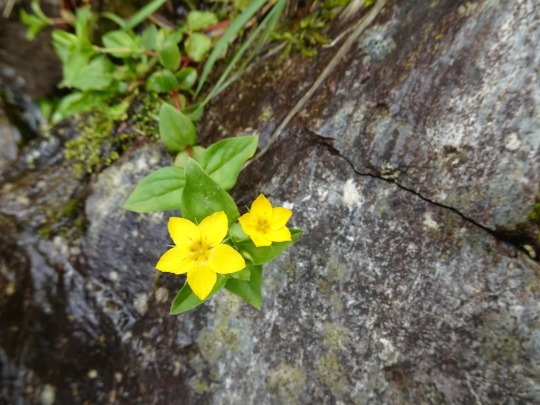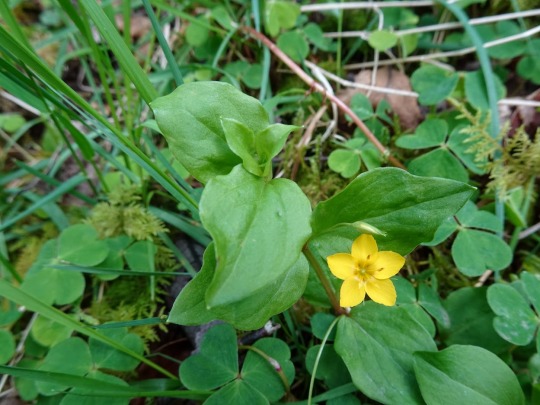#Lysimachia nemorum
Explore tagged Tumblr posts
Video
n92_w1150 by Biodiversity Heritage Library Via Flickr: A new British flora;. London,Gresham Pub. Co.,1919.. biodiversitylibrary.org/page/11453009
#Floras#Great Britain#New York Botanical Garden#LuEsther T. Mertz Library#bhl:page=11453009#dc:identifier=https://biodiversitylibrary.org/page/11453009#Wayfaring Tree#Viburnum Lantana#L.#Honeysuckle#Lonicera Periclymenuum#Woodruff#Asperula odorata#Primrose#Primula vulgaris#Huds.#Wood Loosestrife#Lysimachia nemorum#Small Periwinkle#Vinca minor#flickr#flower#flowers#plant#plants#wildflower#wild flower#wildflowers#wild flowers#botany
0 notes
Photo


Lysimachia nemorum, yellow pimpernels, didn’t historically have many ethnobotanical uses. They’re a very pretty flash of color in the Scottish Highlands, though! Pimpernels are in the primrose family, Primulaceae, and their genus, Lysimachia, has undergone a lot of reclassification lately. They’re closely related to the scarlet pimpernel, Lysimachia arvensis (recently moved from Anagallis), which is a common garden flower, and of course, was as the non de guerre of the hero of Baroness Orczy novels. Unlike the scarlet pimpernel, though, they tend to grow in shaded, damp areas. Interestingly, they’re also closely related to starflowers, including western starflower, Lysimachia latifolia (moved from Trientalis), which is common on the west coast of North America and has a small, edible tuber.
I’ve seen the scarlet pimpernel cited as the inspiration for J.R.R. Tolkien’s Elanor, a plant he described as growing in Middle Earth in Lórien. I personally think the yellow pimpernel is a more likely option, though, because it’s more likely to grow in ancient woodland areas with old growth and, after all, Tolkien indicated that it was yellow (its name meaning “sun-star” in Sindarin).
#Lysimachia nemorum#yellow pimpernel#Plants of Scotland#Plants of the United Kingdom#Plants of Middle Earth?#botany#I thought this was going to be a really short post and it just kept getting longer#the professor that got me into botany in the first place LOVED Tolkien#He recommended a book about plants in Middle Earth and for the life of me I cannot remember what it was called#ethnobotany#Tolkienology
36 notes
·
View notes
Text

Yellow pimpernel
Shamrag Voirrey
Lysimachia nemorum
7 notes
·
View notes
Text
Yellow Pimpernel #wildflowers
Lysimachia nemorum. Picture taken June 1. #plants #nature #naturephotography #woods

View On WordPress
0 notes
Text
Algunas especies indicadoras de bosques centenarios - Español
(Read in English)
Los bosques centenarios también contienen espacios abiertos, tanto temporales como permanentes como pueden ser los claros, pastos de ciervos, caminos, charcas y riachuelos.

Otros espacios abiertos temporales pueden ser creados cuando un árbol cae al suelo.
Los bosques-pasto o dehesas, con unos pocos árboles dispersos, también son una forma distintiva de bosque.
Y, como he mencionado antes, estas áreas permanecen relativamente inalteradas, con hábitats de alto valor y ecosistemas desarrollados, características que se desarrolla en gran medida gracias a uno de los grandes valores de los bosques centenarios: los suelos.
Suelos bien desarrollados permiten a algunas especies de flores crecer en primavera tapizando el piso del bosque y por tanto, pueden funcionar como especies indicadores de suelos poco alterados.
Algunas especies son los jacintos de los bosques (Hyacinthoides non-scripta), la anémona de bosque (Anemone nemorosa), el botón de oro (Ficaria verna), el ajo de oso (Allium ursinum), la berza de perro (Mercurialis perennis), el muraje amarillos (Lysimachia nemorum), y otras hierbas gramíneas ( familia Poaceae) y hierbas de pastos (familia Cyperaceae).


0 notes
Photo

Yellow Pimpernel, lysimachia nemorum - high resolution image from old book.
0 notes
Photo






Orchids aside, Latterbarrow is just a really lovely reserve. It has some superb limestone pavement, woodland and meadow. The best bit about it is the drifts of wild aquilegia. As I was toddling happily around the place, I met a lovely old man walking his dog who offered me some tips on where to find the best orchids. As he strode away up the bank, he pointed at the masses of purple blooms and shouted happily "isn't this the best! No idea what it is." Sadly as well as being lovely, he was also too hard of hearing to catch me shouting about wild aquilegia. From top to bottom: Aquilegia vulgaris, Common Rock Rose (Helianthemum nummulariam), Yellow Pimpernel (Lysimachia nemorum), Germander Speedwell (Veronica chamaedrys).
0 notes
Photo


Wild flowers on Arran 63: Yellow Pimpernel (Lysimachia nemorum). Glenashdale, 9th July 2015.
0 notes
Photo

Lysimachia nemorum por TeresalaLoba by TeresalaLoba on Flickr.
#Lysimachia nemorum#Ephemerum nemorum#Lerouxia nemorum#Nummularia sylvatica#Murage amarillo#Pimpinilla menor#Yellow pimpernel#Myrsinaceae#Ruta dos tres rios#Rio das Lañas#PR-G121#Touro#A Coruña#Galicia#Spain#Teresalaloba#flores silvestres#silvestres de Galicia#flora de galicia#flora silvestre#wildflowers#biodiversidad#biodiversity#flora galega
0 notes
Photo

Yellow Pimpernel, Lysimachia nemorum.
6 notes
·
View notes
Text
Some ancient woodland indicator species - English
(Lee en español)
Ancient Woodlands also contain open spaces, both temporary and permanent such as glades, deer lawns, rides, ponds, and streams.

Other temporal gaps can be created when a tree falls down.
Wood-pastures, with a few scattered trees, can also be a distinctive form of woodland.
And, as I mentioned before, they are areas relatively undisturbed, with highly valuable habitats and developed ecosystems, characteristics that can develop thanks to one of the greatest values of ancient woodlands: soils.
Well developed soils will aloud some species of flowers to grow in spring covering woodland floors. This flowers then, can work as indicator species of undisturbed soils.
Some of this species are bluebells (Hyacinthoides non-scripta), wood anemona (Anemone nemorosa), celandine (Ficaria verna), wild garlic (Allium ursinum), dog’s mercury (Mercurialis perennis), Yellow pimpernel (Lysimachia nemorum), grasses and sedges (Poaceae and Cyperaceae families).


0 notes
Text
Yellow Pimpernel #wildflowers
Lysimachia nemorum. (more…)
View On WordPress
0 notes
Text
Yellow Pimpernel #wildflowers
Lysimachia nemorum. (more…)
View On WordPress
0 notes
Text
Yellow Pimpernel #flowers
Lysimachia nemorum. (more…)
View On WordPress
0 notes
Photo

Wood Loosestrife, lysimachia nemorum - high resolution image from old book.
0 notes
Text
'Of the woods' #wildflowers
‘Of the woods’ #wildflowers
Yellow Pimpernel, Lysimachia nemorum. (more…)
View On WordPress
0 notes